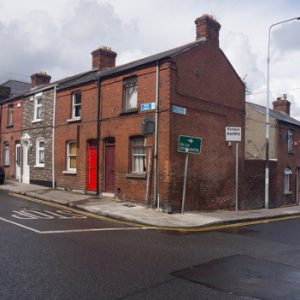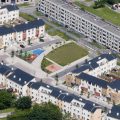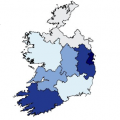
Social Housing – Some Data
7 Mar 2018Key Point
The main categories in need of social housing in Dublin are those in single person households, the unemployed and those living in private rented accommodation.
Introduction
There were 85,799 qualified applicants for social housing support in Ireland on 28 June 20171 . This amounts to approximately five per cent of all households.
- The largest share (42%) of those who qualified was found in the four Dublin local authorities (35,667). This is equivalent to 6.7% of the housing stock in Dublin (530,753).
- Dublin City Council has the highest share of applicants relative to its stock of housing in the State at 8%.
- It is followed by Cork City (7.8%), Fingal (6.9%) and Galway City (6.6%). The lowest shares of applicants relative to housing stock are found in Donegal (1.1%), Roscommon (1.7%) and Leitrim (1.8%).
Household Composition and Employment Status
We have examined the figures available for the four Dublin local authorities. The largest share of qualified applicants in Dublin (43%) is single person households (15,331). See figure 1 for a further breakdown.
Figure 1
(Source:Housing Agency,2018)
Key points:
- The second largest household group (33%) are single persons with a child/children (11,708), followed by couples with/without children (8,476) at 24%, and multi-adult households (152) at 0.4%.
- 19,925 or 56% of main applicants for social housing in Dublin are unemployed and in receipt of social welfare.
- The second highest share of applicants (24%) are employed (8,388), followed by the 11 per cent of applicants reliant on one-parent family support (3,969). See figure 2.
Figure 2

(Source: Housing Agency, 2018)
Current Tenure and Basis of Need
The current housing tenure of social housing applicants in Dublin is dominated by those who are renting in the private sector (60.2%). Approximately one-in-four (26.4%) live with parents, relatives or friends. See table 1.
Figure 3 shows the aggregate breakdown of the basis of need for social housing support in the four Dublin local authorities2.
Figure 3
(Source: Housing Agency, 2018)
Reliance on rent supplement3 is the most common basis of need for qualified applicants in Dublin at 42% (14,914). Almost one-in-four (24%) cite unsuitable, overcrowded or unfit accommodation (8,638), and approximately one-in-five (20%) require separate accommodation (6,991). Those categorised as reliant on an ‘institution, emergency accommodation or hostel’ account for 9.8% (3,497). The proportion of qualified applicants whose basis of need was based on being in emergency accommodation or hostels decreased from 11.3% in 2016 to 9.8% in 2017. Those with disabilities and exceptional medical needs account for 1,551 applicants (4.3%). Unsustainable mortgages account for 0.2% or 76 applicants in 2017 – down from 0.3% or 110 applicants in 2016.
What Type of Accommodation is Required?
- The majority of applicants (83%) on the housing support list in Dublin require general accommodation (29,669).
- Circa one-in-ten (9.3%) require homeless accommodation (3,327), followed by 4.3% who require accommodation suitable for those aged 65 years old or more (1,516), those with a disability4 at 2.3% (805), and travellers at 1.0% (350).
As of January 2018, there were 3,919 adults and 2,509 dependents (those under 18 years old) in homeless accommodation in Dublin (6,428 in total). It is estimated that some 4,000 exits out of homelessness were achieved in 20175 .
Government spending to alleviate housing need continues to increase. Capital expenditure on housing will increase by €310 million (41%) in 2018 relative to 2017, from €755m to €1,065m. Current expenditure will increase by €197 million (35%) from €566m to €763m6.
_______________
Notes:
1 The Summary of Social Housing Assessments 2017 (SSHA) captures the total number of households qualified for social housing support across the country whose social housing need was not being met as of the count date on 28 June 2017.
2 There are 13 categories for basis of need in the Social Housing Assessment
3 Households who are already living in local authority or approved housing body accommodation, or accommodation provided via the Housing Assistance Payment (HAP), the Rental Accommodation Scheme (RAS) or accommodation provided under the Social Housing Capital Expenditure Programme or any household on a transfer list, are not included in the net need number. Households in these categories of social housing support are deemed to have had their housing need met.
4 Individuals with ‘an enduring physical, sensory, mental health or intellectual issue’
5 Department of Housing, Planning and Local Government (2018), ‘Rebuilding Ireland: Housing Delivery 2017’
6 Department of Public Expenditure and Reform (2017), ‘Revised Estimates Volume 2018’








